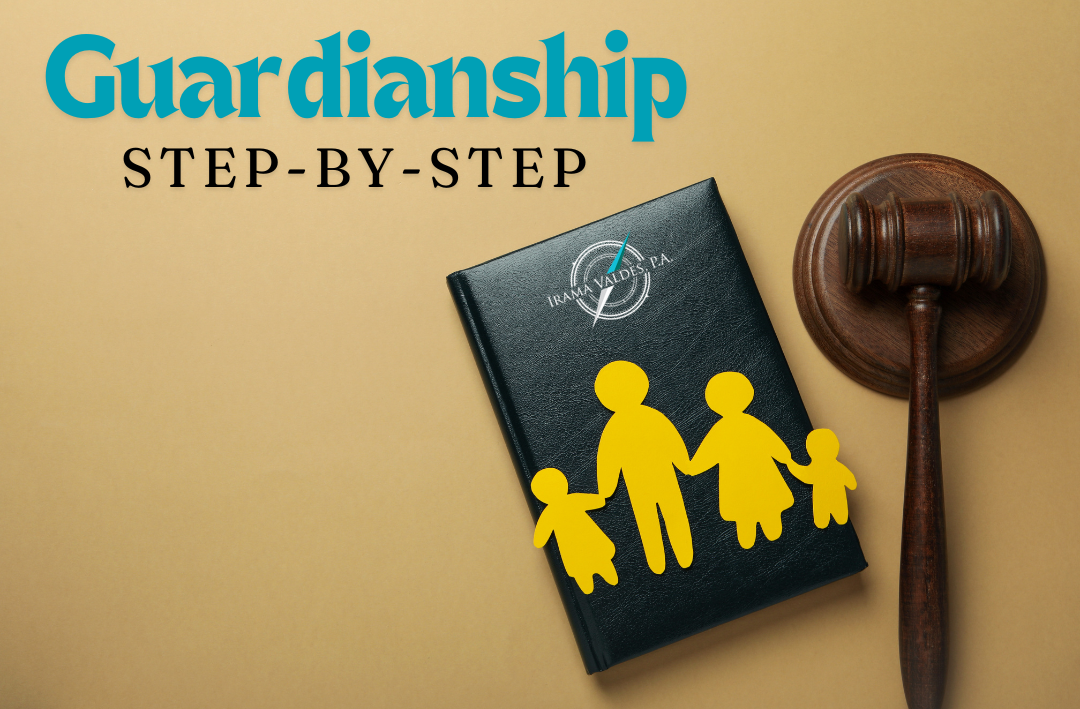One of the areas of law we practice is Guardianship. Initiating a Guardianship proceeding can be burdensome, confusing, and costly. It certainly helps to know what to expect. For the benefit of our clients (and as a resource to attorneys just starting out in the field), tere is a step-by-step guide to getting someone adjudicated incapacitated in Florida, including dealing with lesser restrictive alternatives and objections:
Step-by-Step Process for Adjudication of Incapacity
1. Consult an Attorney:
– Hire an attorney experienced in guardianship law to guide you through the process and ensure all legal requirements are met.
2. File a Petition to Determine Incapacity:
– Prepare the Petition: Include the alleged incapacitated person’s details, factual basis for incapacity, and identification of interested parties.
– File the Petition: Submit the petition to the appropriate probate court (see Fla. Stat. 744.3201).
3. Serve Notice:
– Serve the Alleged Incapacitated Person: Provide a copy of the petition and a notice of rights.
– Notify Interested Parties: Serve notice to the next of kin and other interested parties (see Fla. Stat. 744.3201).
4. Temporary Suspension of Powers of Attorney:
– Automatic Suspension: Filing the petition automatically suspends any existing power of attorney related to the matters in question (see Fla. Stat. 744.3203).
5. Appointment of an Attorney:
– Court-Appointed Attorney: The court will appoint an attorney to represent the alleged incapacitated person if they do not already have one.
– The Alleged Incapacitated Person may elect their own attorney.
6. Examination by Committee:
– Appoint Examining Committee: The court appoints a three-member committee consisting of a physician and two other professionals (see Fla. Stat. 744.331).
– Conduct Examinations: The committee members examine the alleged incapacitated person and submit individual reports.
7. Lesser Restrictive Alternatives:
– Evaluate Alternatives: Before deciding on guardianship, consider less restrictive alternatives such as durable power of attorney, health care surrogate, or other supportive services.
– Document Alternatives: Include a discussion of why lesser restrictive alternatives are insufficient or inappropriate in your filings and at hearings.
8. Submit Reports:
– Committee Reports: The examining committee submits their findings to the court.
– Review Reports: The petitioner and other interested parties review the reports.
9. Hearing on Incapacity:
– Schedule Hearing: The court schedules a hearing to determine incapacity. Usually about takes place 1-3 months after the initial petition to determine incapacity is filed.
– Present Evidence: Present evidence, including the committee’s reports, witness testimony, and any objections.
– Consider Objections: The court considers any objections raised by the alleged incapacitated person or interested parties.
– Standard of Proof: The petitioner must prove incapacity by clear and convincing evidence.
10. Adjudication of Incapacity:
– Court Decision: If the court finds the person incapacitated, it issues an order of incapacity, specifying the areas of incapacity (see Fla. Stat. 744.331).
11. File Petition for Appointment of Guardian:
– Prepare the Petition (and supportive pleadings): Include detailed information about the proposed guardian and why the guardianship is necessary (see Fla. Stat. 744.334). (We do this simultaneously with the Mental Health Proceedings so the Guardianship file is ready for the court to appoint a guardian the same day as the incapacity hearing. Does it always work out like that? Nope. It depends on the specifics of the case).
– File the Guardianship Pleadings: Submit it to the court.
12. Notice of Hearing for Guardian Appointment:
– Serve Notice: Provide notice of the petition and hearing to the alleged incapacitated person and other interested parties (see Fla. Stat. 744.3371).
13. Hearing on Guardian Appointment:
– Usually about takes place simultaneously with the incapacity hearing unless the facts of the case dictate otherwise.
– Present Evidence: Present evidence supporting the need for a guardian and the suitability of the proposed guardian.
– Consider Alternatives and Objections: Address any lesser restrictive alternatives or objections raised during the hearing.
– Court Decision: The court decides on the appointment of a guardian.
14. Issuance of Letters of Guardianship:
– Court Order: If the court appoints a guardian, it issues letters of guardianship, specifying the guardian’s powers and duties.
15. Post-Appointment Requirements:
– File Initial Report: The guardian files an initial guardianship report within 60 days of appointment.
– Annual Reviews: The guardian submits annual reports to the court for review (see Fla. Stat. 744.3215).
Addressing Objections and Lesser Restrictive Alternatives
– Evaluate Alternatives Thoroughly: Document efforts to explore and implement lesser restrictive alternatives before petitioning for guardianship.
– Address Objections: Be prepared to respond to objections raised by the alleged incapacitated person or interested parties with evidence and legal arguments.
– Use Mediation: Consider mediation to resolve disputes or objections related to the incapacity determination or guardianship.
This process ensures that the rights of the alleged incapacitated person are protected while providing necessary legal and protective measures.
Please remember that this post is only intended for educational and informational purposes. This is not intended to be legal advice. To better understand how the process above effects the particulars of your case, please give us a call!








